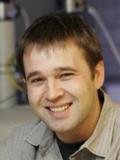Biochemistry and Chemical Biology
At Ohio State, biochemistry and chemical biology research covers important topics from understanding fundamental life processes to developing agents to improve human health. Broad areas include molecular biology, structure-function studies of biomolecules, enzymology, nucleic acid biochemistry, development of peptide and small molecule probes, protein structure and folding including X-ray crystallography and NMR, and protein engineering. Many members of the department work in interdisciplinary areas between biology and other areas of chemistry (bioanalytical, bioinorganic, bioorganic, biophysical).
Resources
The Campus Chemical Instrument Center (CCIC) has world-class shared resources in high-field NMR, mass spectrometry, proteomics, and X-ray crystallography. The department's Biophysical Interaction and Characterization Facility (BICF) has analytical ultracentrifugation, CD spectroscopy, fluorescence, and calorimetry. The department also has excellent shared small-molecule NMR and mass spectrometry instrumentation.
Students in the Biochemistry division are eligible for the NIH T32 Molecular Biophysics Training Program (MBTP), and many labs interact with the outstanding nucleic acids community at OSU through the Center for RNA Biology.
In addition to the Chemistry Ph.D. program, students with more biological interests should consider the Ohio State Biochemistry Program (OSBP), and students with more physical interests should consider the Biophysics Graduate Program.
Research Areas
- Bioinorganic chemistry
- Chemical biology
- Computational biology
- Drug design and delivery
- Enzymes
- Laser spectroscopy
- Mass spectrometry and proteomics
- Metabolomics
- Molecular biology
- Molecular biophysics
- NMR spectroscopy
- Nucleic acids (chromatin & DNA, RNA)
- Protein structure and folding
- Proteomics
- Structural biology
- X-ray crystallography
Faculty

Our group studies the mechanisms of signaling across biological membranes. We are particularly interested in the oligomerization of stress receptors, which we investigate with a combination of optogenetics, advanced microscopy, and in vitro biochemistry.
- Enzymes
- Molecular Biology
- Molecular Biophysics
- Nucleic Acids (chromatin & DNA, RNA)

We design and synthesize polymer, peptide, lipid and nucleic acid constructs to achieve controlled chemical delivery in vivo. Research efforts begin with chemistry and trace a path through biophysical, biochemical and cell culture studies.
- Chemical Biology
- Drug Delivery
- Biomaterials

Our research program focuses on protein dynamics (enzymes, regulatory and intrinsically disordered proteins) in relationship to function using NMR and long
MD simulations. It also covers Metabolomics of complex biological samples to uncover the metabolic response to health and disease.
- Molecular Biophysics & Structural Biology
- NMR
- Theory & Computation

Protein and nucleic acid (DNA/RNA) structure and dynamics; gene regulation; allostery; DNA recombination; riboswitches; transcription; enzyme dynamics; oligomeric assemblies; NMR spectroscopy; calorimetry; modeling; drug discovery.
- Molecular Biophysics & Structural Biology
- NMR
- RNA

(i) RNase P as a model system to uncover mechanisms of protein-aided RNA catalysis. (ii) Metabolism of Amadori compounds by Salmonella.
- Molecular Biology
- Enzymes
- RNA

The Jackman lab uses enzyme kinetics, model organism genetics, and RNA biochemistry to uncover the molecular mechanisms and biological functions of tRNA processing and modification enzymes that catalyze critical reactions in biology.
- Molecular Biology
- Enzymes
- RNA

Development of multidimensional solid-state NMR methods and their applications to structural and dynamic analysis of large biomacromolehummocular protein-protein and protein-DNA assemblies, including amyloids and chromatin.
- Experimental Physical Chemistry & Spectroscopy
- Molecular Biophysics & Structural Biology
- NMR

Femtosecond spectroscopy of biomolecules and nanomaterials for solar energy conversion and photocatalysis; photoinduced proton-coupled electron transfer in molecular and nanoscale systems; exciton and carrier dynamics in earth-abundant metal oxides.
- Experimental Physical Chemistry & Spectroscopy
- Solar Energy Conversion
- DNA & Chromatin

We investigate the role of the actin cytoskeleton in metastasis of human tumors and in immune response. Additionally, we study modes of toxicity of bacterial toxins and mechanisms employed by human immune peptides to intercept bacterial and viral infections.
- Enzymes
- Molecular Biophysics & Structural Biology
- Molecular Basis of Disease

Combinatorial and statistical approaches to protein stability, structure and function; protein folding; protein engineering; protein therapeutics
- Molecular Biophysics & Structural Biology
- Protein Structure & Folding
- Chemical Biology

Structure and function of RNA-protein interactions critical for assembly of HIV-1 and other retroviruses; Quality control by aminoacyl-tRNA synthetases and related trans-editing enzymes.
- Chemical Biology
- RNA
- Enzymes

Our goal is to understand the molecular mechanisms by which nucleic acids regulate basic cellular processes such as gene expression.
- Molecular Biophysics & Structural Biology
- RNA
- Molecular Biology

Synthetic protein chemistry; expressed protein ligation; solid phase chemical ligation; histone post-translational modification; nucleosome structure and dynamics
- Chemical Biology
- Protein Structure & Folding
- DNA & Chromatin

Discovery and delivery of macrocyclic compounds as chemical probes and therapeutics against protein-protein interactions; delivery of proteins and nucleic acids into mammalian cells
- Chemical Biology
- Bioorganic & Medicinal Chemistry
- Biotechnology

My lab studies the structural dynamics and molecular evolution of sperm-egg interactions in multiple animal models (humans, salamanders, abalone) using NMR, mass spectrometry proteomics, and other analytical methods to understand barriers to hybridization and drivers of human infertility.
- Molecular Biophysics & Structural Biology
- NMR
- Proteomics

My research interests are mainly focused on using biochemical and biophysical techniques to investigate the structure and functional dynamics of biomolecules and their interaction which are important for their biological functions.
- Molecular Biophysics & Structural Biology
- Chemical Biology
- Cancer

Our laboratory is broadly interested in the molecular mechanisms and consequences of RNA cleavage in the cell. For instance, widespread RNA cleavage and decay is employed by both the host and viruses to promote or suppress the innate immune response. However, it remains unanswered how and why both benefit from such a widespread endonucleolytic cleavage, and many molecular mechanisms of it are unknown.

